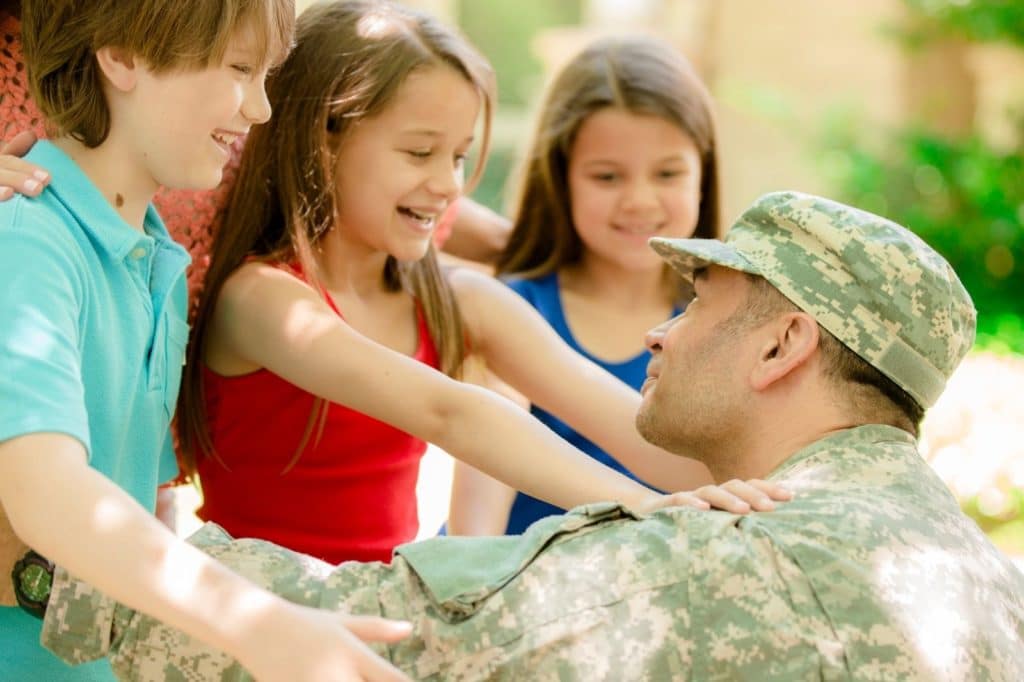In my work with military families, I hear often that transitioning out of the military was just as hard (and sometimes even harder!) than the transitions the families experienced throughout the deployment cycle. Families tell me that even though there is a hectic tempo and constant adjustments that must be made during their military service, being an active-duty military family can also bring a sense of stability and belongingness to the military community.
Transitioning out of the military means brand new adjustments and challenges for everyone in the family. For example, it may mean adjusting to a new home or neighborhood that is off-post or outside of a military-connected community. For the veteran, it often means finding and adjusting to a new job and a transition to a new healthcare system. For military spouses, it may mean returning to work after a long period of being a homefront parent. On top of all that, military families can feel like it’s not just an adjustment to new routines, but a shift in their family identity.
There are also unique challenges that children of transitioning families face. For many military families, the active-duty to veteran/retiree transition happens when children are adolescents. This is during a time when teens are already working to adapt to the changes happening in their bodies and developing their sense of identity. I’m sure we can all remember how challenging this age is all on its own. Combining that with moving to a new town or school and again leaving behind friends and teachers can create even more stress.
One family I spoke with shared a different scenario: They decided to stay where they were upon retirement. However, it was still extremely challenging for their children to “stay planted” after so many years of not becoming “too close” with others to make moves less difficult.
The Impact of Shifting Routines
Another challenge for children may be the big changes in the routines or pacing of family life. For instance, life at home may shift if a veteran parent begins school and must spend time at home studying instead of spending more time with family. Life may shift as a parent begins working a job with different hours than before or a civilian homefront parent begins a career for the time. Because finances are often impacted by this transition, it may mean changes in what is feasible for family outings or activities. Because all of us (and especially children) thrive best with consistency and predictability in our world, these changes can be disruptive and stressful for children.
It’s also extremely important to understand the trickle down of a parent’s stress on their children. When big changes happen, our children look to us to understand what the changes mean for them. Will we be OK? Will be loved and cared for? When parents are able to effectively manage the stress of the transition, it sends a message to their children that “even when it’s hard, we will be OK.”
Given that these challenges are a normal part of a military to veteran/retiree transition, there are things you can do to support your family and children during this time.
Take a Gentle Approach
When children are stressed, they may be more sensitive, irritable, or forgetful. They may have more outbursts, fights with siblings, or forget household chores. This is not the time to enforce new harsh rules or punishments. Though it’s important to help children understand what acceptable and not acceptable behavior is, it is also important to pay special attention to what your children may be trying to communicate during this time. These shift in behavior can often be a sign of stress, and your child may be communicating the need for comfort or support.
Take the Opportunity to Connect
The cycle of deployment through an active-duty military family’s career can mean lots of separations over the course of a child’s life. The end of deployments, temporary duty, and field trainings may allow the opportunity for more quality time with your little ones. Take notice of your child’s stage of development. In what areas are they growing most right now? What are they doing, learning, or most interested in. Take the time to just play together.
Seizing those opportunities and spending the time and energy to connect or reconnect with your children sends the message that you are there for them through this transition, both physically and emotionally.
Communicate, Communicate, Communicate
Sometimes, stress gets the best of us and we aren’t our best versions of ourselves. We get frustrated, yell, or make a decision we aren’t proud of. It’s human. And yet, without good communication, children can personalize a parent’s stress. What’s important in supporting your kids isn’t about not making mistakes. It’s about communicating to your children, in a developmentally appropriate way, that the stress is not because of them.
For example, you could say: “These changes are hard for everyone, and sometimes these changes make me feel frustrated, or sad, or nervous. And when I feel that way, I sometimes make mistakes as a parent. But I want you to know I’m not angry at you, and I love you no matter what.”
Owning your own challenges can help normalize these feeling for your children and help them understand that they are loved and supported no matter what.
Practice and Model Self-Care
We are best able to care for others when we take good care of ourselves. This is always important, but it is critical during times of change and transition. Self-care can be accomplished in many ways, and what you need most in order to best care for yourself can change as things change in your life. For example, when your spouse was deployed, the most important self-care for you may have been having friends over for dinner. However, when your spouse is home, you may need more alone time.
Take the time to consider what you need most for yourself right now and commit to consistent engagement in self-care. You’ll find you have more energy to give your children, and it will also model the importance of self-care for them!
As you go through this transition together as a family, a lot may change. However, know that your service to this country and your experiences as a military family can continue to be honored. Your family will always be a military family.










